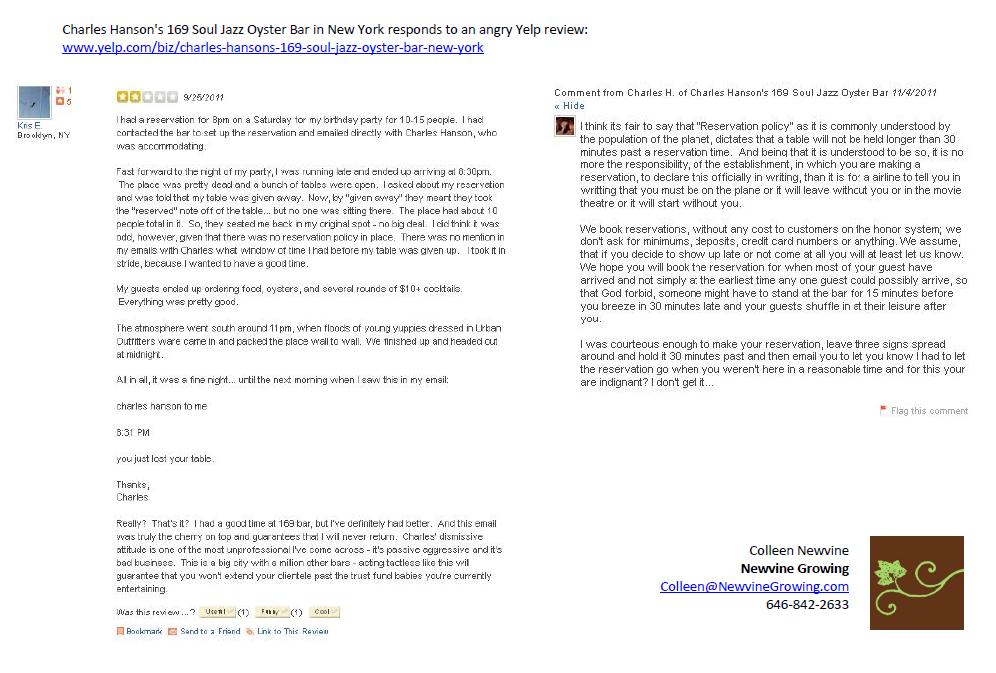
When I was at a restaurant recently, one of the owners was having a minor freak out because someone criticized them on Facebook.
It was one comment, and from what I could tell, it seemed snarky but fair. Instead of using it as a chance to say yes, you’re right, we could probably do better on that, he perceived it as an attack, got defensive, snarked back then deleted the criticism.
He missed a golden opportunity.
Here’s a terrifying truth for many businesses: people are talking about you, and not all of it is positive.
This has always been the case, but social media makes these amateur critiques much more public. Instead of just complaining about your terrible service to friends over beers, anyone inclined to shout it from the electronic rooftops can take to Yelp or Twitter or any number of other places.
Think about the Fortune 500, the American companies generating the most revenue, and whether it’s Wal-Mart, General Motors or J.P. Morgan Chase, they generate plenty of public criticism. But that doesn’t mean they shy away from being part of the conversation, as shown in this list of Fortune 500 social media stars.
One of the marketing services I offer is conducting customer surveys. Businesses sometimes pay thousands of dollars and take weeks or months to find out what customers are thinking. It’s valuable information. Social media offers you that feedback for free, if you’re willing to take it.
Snark can be one of the speed bumps. Copious articles have detailed the rise of snark online, pining the blame on everything from anonymous comments to the sarcasm of the ironic hipster. Maybe you don’t just get someone saying your sandwich was disappointing, but instead “Worst. Sandwich. EVER. #lunchfail.” I get that it’s hard not to get defensive in the face of the melodrama.
So I offer these five tips to put online criticism — even the snarky comments — to work for you:
1. Tune in to what’s being said — regularly check your Facebook page and your Yelp profile, for example, and use searches on Twitter and Instagram to look for comments about your business.
2. Take a deep breath — just as you might prefer your spouse tell you discreetly that your fly is open rather than shouting it across the room, it can sting to hear criticism publicly, even if it’s valid and helpful. Before you respond in anger, cool down. If you really care about your business, it might hurt to hear that you’ve missed the mark. Take time to be hurt before taking your next step.
3. Respond to complaints publicly, discuss privately – show your concern in your community but don’t feel you have to engage in a visible debate. Answer but don’t be defensive. Acknowledging concerns gives you the chance to explain. Maybe you had an off day and you know it. If you show your humanity, reasonable customers will probably understand. Then take the individual complaint off line — address it in email or by phone, for example — to offer a solution like a refund or an invitation to come back.
4. Answer promptly – if one person has a question or concern, answering publicly might save you numerous emails and calls about the same thing.
5. Communicate results — do you get a lot of complaints about specific issues? Fix what’s broken, then tell social media fans how you’ve listened to them and appreciate their help
I have found that simply responding calmly can defuse many hostile situations. The critic realizes it’s a real human being on the other end of the conversation and upon being heard might engage in a rational conversation.
That can take a #socialmediaFAIL and turn it into #winning.
Bonus tip #6 — hopefully not all social media feedback will be negative, so be sure to say thank you. When someone pays you a compliment, let them know you’ve heard it and you appreciate it.

My related posts:
- Marketing Monday: How do you handle an unhappy customer?
- Marketing Monday: The difference between knowing the tools and knowing what to say
Colleen Newvine Tebeau is a former reporter and editor who then earned her MBA at University of Michigan with emphases in marketing and corporate strategy. She is a marketing consultant who helps small and midsized organizations with strategy and tactics, including social media and communications.


Leave a reply